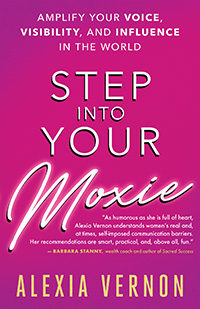How to Have a Daring Conversation
 An excerpt from Step into Your Moxie by Alexia Vernon
An excerpt from Step into Your Moxie by Alexia Vernon
The word moxie has become synonymous with vigor, verve, pep, courage, nerve, aggressiveness, skill, and know-how, and the new book Step into Your Moxie: Amplify Your Voice, Visibility, and Influence in the World by speaking and leadership coach Alexia Vernon presents a soul-stirring call to action for women to speak up for themselves and the ideas and issues that matter most to them. We hope you’ll enjoy this excerpt from the book.
# # #
The key to having a daring conversation is giving yourself enough time to properly prepare for one — but not so much time that you never have it, or that by the time you have it, the person you are speaking with either has no idea what you are talking about or the situation that was such a big deal to us didn’t even register on her Richter scale. While time is subjective, and the ten to twenty minutes of sensation I feel before I speak may feel like twenty eternities in purgatory for someone who is brand-new to speaking, when it comes to a daring conversation, as a rule it’s best to have it within a week of deciding your organs could finally unstick themselves if you said something. And before you do, here is how you can set up yourself, and the other parties involved, for success.
The words that we use, from moment to moment, in a conversation where conflict could transpire (or has transpired) often determine whether things go difficult or daring. I recommend using the following words as often as possible:
Yes. My favorite agreement word. Ever. It makes someone instantly feel seen and heard. You can say “yes” after someone shares an idea, an opinion, or a feeling, but do refrain from saying “yes and” and then redirecting the conversation back to you. “Yes and” works great in comedy, but “yes” as a complete sentence usually works better in daring conversations.
Thank you. You can say “thank you” to someone for sharing where she is coming from, for being vulnerable, for telling you the truth, for helping you understand her perspective, or for acknowledging wrongdoing or committing to better behavior in the future.
What I want for us is… These words work great for communicating what you want from the conversation. Try not to use them to linguistically wrestle for power over someone but rather to propose something that the other person, no matter his or her perspective, likely wants too.
Tell me more. This phrase works whenever people are dropping into vulnerability and you want them to know you really want to hear what’s going on, even if it’s uncomfortable. Or, on the flip side, this short phrase is effective when you want to nudge people beyond surface talk so they can go to the source of what’s truly going on.
I’m sorry. This is a very appropriate response when you have truly done something wrong, you want to take responsibility for it, and even more important, you want to communicate what you will do differently moving forward. Sometimes you may be sorry for the way someone is feeling, or the way you unintentionally made her or him feel — even if you haven’t done anything super sorry-
worthy. Be clear on what you are sorry for, and state that. (Again, please don’t think I’m giving you a hall pass for giving your power away. The kind of “I’m sorry” I’m recommending here is different from the “I’m sorry” you use when you feel insecure or actually want someone else to apologize to you. “I’m sorry” must not be a quid pro quo.)
What do you need (from me) in order to move forward? When you brainstorm creative ways to play nicely together in the future, the ultimate expression of compassionate (and super vulnerable) power is to ask what someone else would like to see from you now and in the future. This question alone can resurrect a relationship from collapse, if and when safety has been created in a conversation and everyone is fully committed to a mutually beneficial outcome.
Words and Phrases That Keep Conversations Difficult
On the flip side, I recommend avoiding, at all costs, the following words and phrases, regardless of how entitled you feel to use them or how hooked into them you have been in the past. Why? Because they build a wall between you and the other party — and they are a direct flight back from the land of daring to the land of difficult:
A lot of yous (especially when the conversation is past-oriented). The word you often lands as an accusation and can trigger defensive and blaming behavior. Instead, strive to use the word we. Collective language, whether it’s about what’s happened in the past or what you are committing to in the future, keeps conversations daring.
That’s not what I… It’s easy to go all antagonized attack dog when someone misuses or misinterprets what you have said. Should this happen, calmly (and silently) note the misunderstanding to yourself. Somebody is not receiving the message you are intending to send. Instead of pulling out the claws and taking a bite, take a breath, and then use appropriate words and phrases from the preceding section to explain yourself again. The more uncomplicated you make your second attempt, the more likely it is that your message will be interpreted correctly.
That’s not my problem/responsibility (or that’s your problem/responsibility). Though this is an ugly cousin of the last phrase, I’m calling this one out separately. Because no matter whose problem or responsibility something is (or isn’t), stating this (even if you are entitled to), is like lighting a match by a gas line outside your house and wondering why you burned your entire neighborhood down.
[Something conciliatory] but… No more buts in high-stakes conversations! As we explored in chapter 4, a but negates everything that has come before it. And when you have one foot in a difficult conversation and the other in a daring one, this word can pull you back into the former faster than a preschooler can get her entire family sick during cold and flu season. (I may be wearing a face mask as I write this chapter. Trust the analogy. It’s as tight as my mask.)
[So-and-so] said… Please avoid gossip and triangulation. Leave third and fourth parties out. All that matters is what’s transpiring right now, between you and the other person or parties before you. If you need to address somebody else’s role in a situation, set up a separate time and a separate daring conversation for that.
# # #
 Alexia Vernon is the author of Step into Your Moxie. Branded a “Moxie Maven” by President Obama’s White House Office of Public Engagement, she is a sought-after speaking and leadership coach who delivers transformational keynotes and corporate trainings for Fortune 500 companies and other professional groups and organizations, including the United Nations and TEDx. Visit her online at www.alexiavernon.com.
Alexia Vernon is the author of Step into Your Moxie. Branded a “Moxie Maven” by President Obama’s White House Office of Public Engagement, she is a sought-after speaking and leadership coach who delivers transformational keynotes and corporate trainings for Fortune 500 companies and other professional groups and organizations, including the United Nations and TEDx. Visit her online at www.alexiavernon.com.
Excerpted from the book Step into Your Moxie: Amplify Your Voice, Visibility, and Influence in the World. Copyright ©2018 by Alexia Vernon. Printed with permission from New World Library — www.newworldlibrary.com.









